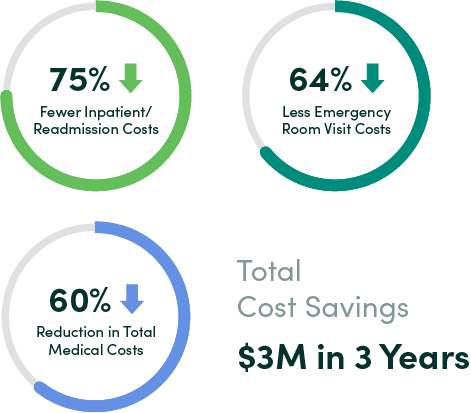Measuring Impact: Integrating Automation into Clinical Practices to Help Improve Health Outcomes
The healthcare industry is rapidly evolving, with automation playing a crucial role in improving efficiency, reducing costs, and enhancing patient care. To successfully implement digital engagement programs that allow organizations to scale and better support both patients and healthcare providers, solutions need to be personalized, easy to implement and provide in-the-moment resources and support.
Why Automation Matters in Healthcare
Automation in clinical practices has proven to be a game-changer, offering tangible benefits:
✅ Reduced Administrative Costs – Cutting healthcare costs by up to 30% and saving the U.S. healthcare system an estimated $265 billion annually. (ThinkBRG) (Compunnel)
✅ More Time for Patient Care – Allowing providers to focus on patients by reducing documentation burdens, increasing time spent on care by 17%. (TATEEDA)
✅ Fewer Hospital Readmissions – Improving patient adherence and reducing readmissions by 67%. (Compunnel) (JK Tech)
✅ Boosted Patient Satisfaction – Enhancing patient experiences with automated support, leading to a 90% satisfaction increase. (JK Tech)
Case Studies: How Automation is Driving Change Across the Industry
1. Fidelis Care Concierge: Scaling Support by 263%
Fidelis Care, a managed care organization, partnered with GoMo Health to provide a personalized member experience and relevant education on condition management. The result? A 263% increase in the ability to scale case manager support by providing the right resources and support to each member.

2. Monroe Plan: Closing Gaps in Pediatric Care
The Monroe Plan utilized personalized text messaging to educate, empower, and motivate parents to bring their children in for annual well visits. This initiative led to a 66% increase in patients attending well-child checkups, directly correlating with early detection of developmental concerns and earlier interventions for better health outcomes.

3. WellCare of Nebraska: Cutting Costs and Improving Outcomes
Through the Baby’s First program, new parents receive customized education on child development, home safety, and emotional well-being. Personalized resources tailored to each member’s social, behavioral, and physical health determinants have been proven to drastically reduce costs and improve outcomes. This resulted in:

The Power of Personalized Engagement in Healthcare
What makes these programs successful is their integration of behavioral science into automation. By tailoring communication and interventions to individual needs, you can create an environment where automation enhances human care rather than replacing it.
The Future of Automated Healthcare is Here
The GoMo Health approach demonstrates how automation, when thoughtfully implemented, can revolutionize healthcare. By reducing provider burnout, increasing efficiency, and improving patient outcomes, automation is paving the way for a more personalized, accessible, and effective healthcare system.
Engagement in Action: Partnership Yields Clinical and Financial Success for GoMo Health Clients
In our newly launched webinar series, hear directly from GoMo Health clients about how personalized engagement programs helped them achieve significant clinical and financial results.







Find Us Online